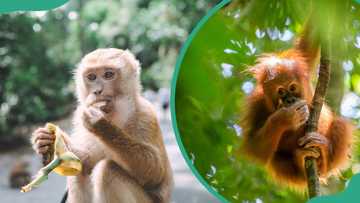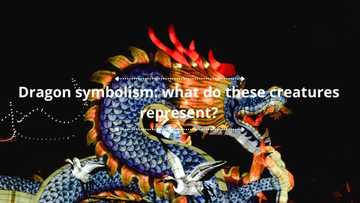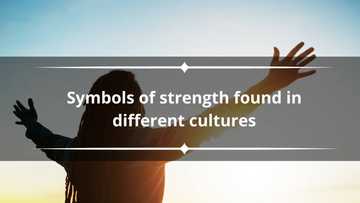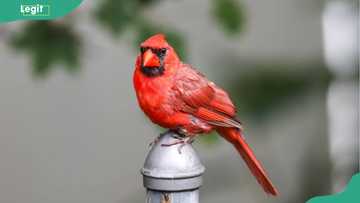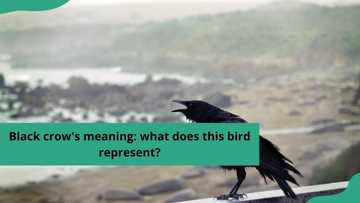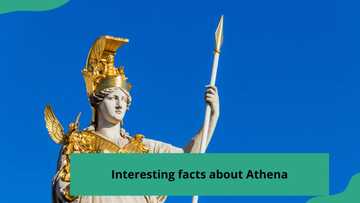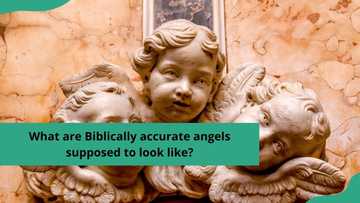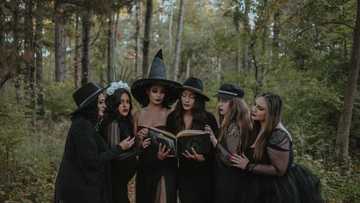African gods and goddesses: 12 deities from African mythology
African mythology is rich with stories of gods and goddesses who are believed to have shaped the world and influenced the lives of humans. These deities have distinct characteristics, powers, and roles. In Africa, each region has its own set of divine beings that are revered and worshipped by the people. Check out this compilation of 12 African gods and goddesses and their powers.
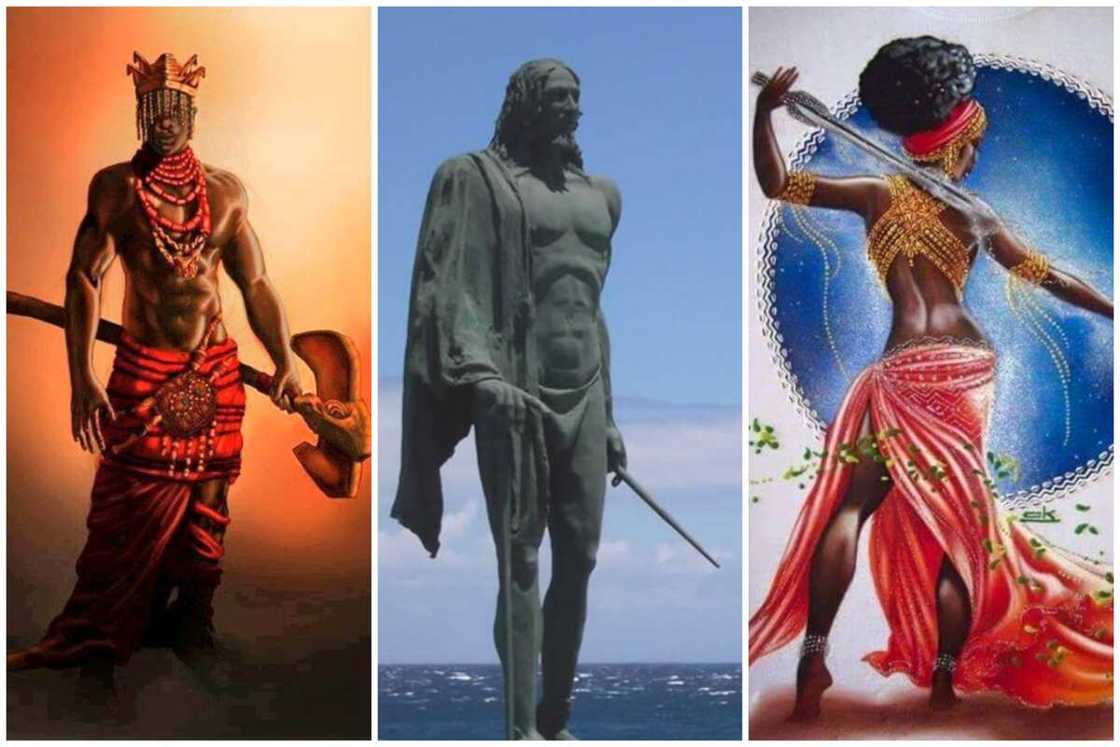
Source: UGC
African deities are often depicted as powerful and influential beings responsible for the world's creation and the protection of humanity. They are also believed to have the ability to shape the natural world and influence human destiny. This article has a list of African gods and goddesses who have inspired the array of storytelling.
Famous African gods and goddesses
African gods and goddesses are often associated with the natural world, such as thunder and lightning, water, and animals like cats and spiders. They come from various pantheons across the continent, each with unique characteristics, powers, and abilities.
How many African gods are there?
It is impossible to say exactly how many gods and goddesses are out there. There are many deities because of the many tribes in Africa, and each tribe believes in their specific gods. However, some pantheons are believed to be more supreme than others. Below is a list of popular deities from African mythology you should know.
1. Ṣàngó
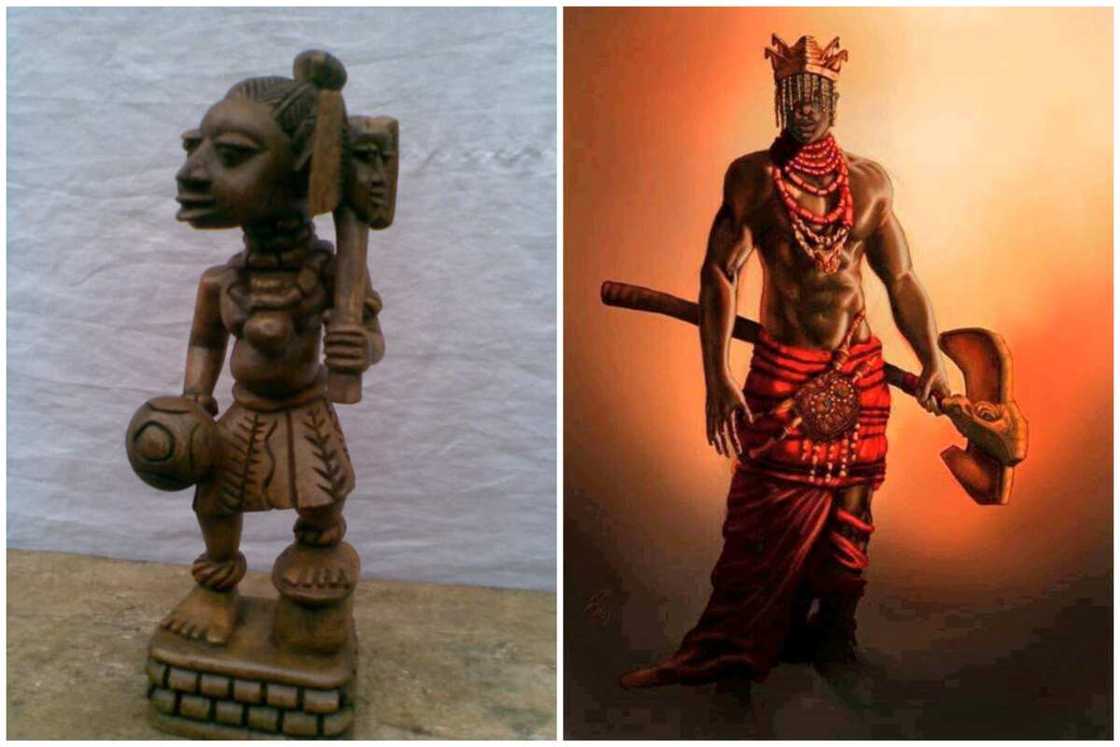
Source: UGC
Ṣàngó is one of the Orisha gods of thunder and lightning in Yoruba mythology. Ṣàngó is worshipped primarily in Nigeria and other West African countries. He is often depicted wielding a double-headed axe and dressed in red, associated with his fiery personality and power.
Ṣàngó is considered a protective deity, able to bring rain and fertility to the land, but also a vengeful one, capable of bringing destruction and chaos to those who cross him. He is widely regarded as one of the most popular and influential gods in Yoruba culture, with his worship still alive today.
2. Heka
Heka is the god of magic and medicine in ancient Egypt. He is often depicted as a youthful figure wearing a headdress. He was considered the source of all magical powers and could heal, protect, and transform.
Heka was also associated with fertility and the creation of new life and was often invoked during childbirth and other important life events. Despite being less well-known than some other major Egyptian deities in the history of Africans, Heka was highly revered in ancient times, and his worship continued for centuries.
3. Achamán
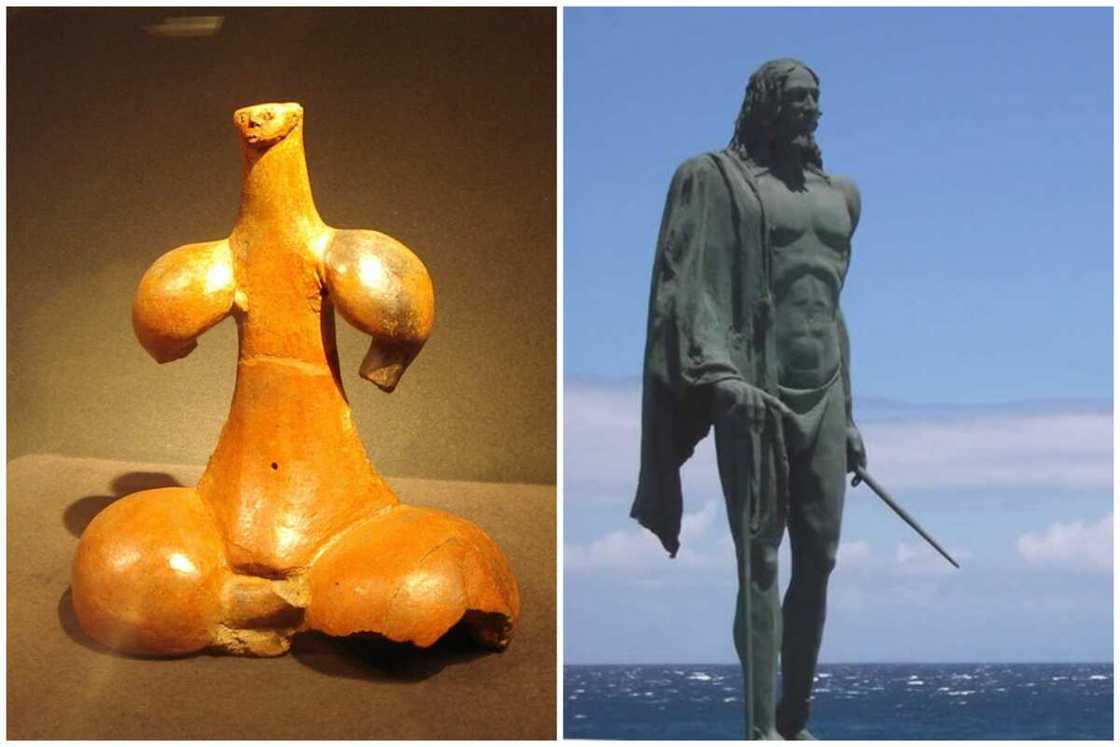
Source: UGC
Achamán is the main god of the indigenous people of Tenerife, known as Guanches. He is believed to be the creator of all, god and father. He created fire, air and land, as well as all the creatures. He lives in the heights but sometimes descends to consider his creation.
Achamán was often depicted as an older man with a long beard and was worshipped through offerings of animals and other gifts. Today, Achamán remains an important figure in the folklore and traditions of the Canary Islands, and his legacy continues to inspire and influence the cultural identity of the Guanche people.
4. Alekwu
When mentioning the African deities, Alekwu cannot be overlooked. He is a powerful god popular among the Idoma people of Northern Nigeria. He maintains social order, protects people, and settles disputes to ensure peace. Alekwu also is believed to have the power to punish sons and daughters of the land who go contrary to the morals and traditions of the land.
His people greatly fear Alekwu due to his ability to punish the offenders, and therefore the Idoma people always strive to ensure they don’t go against the traditions. Alekwu is omnipresent, able to protect and punish, the distance being no barrier.
5. Ògún
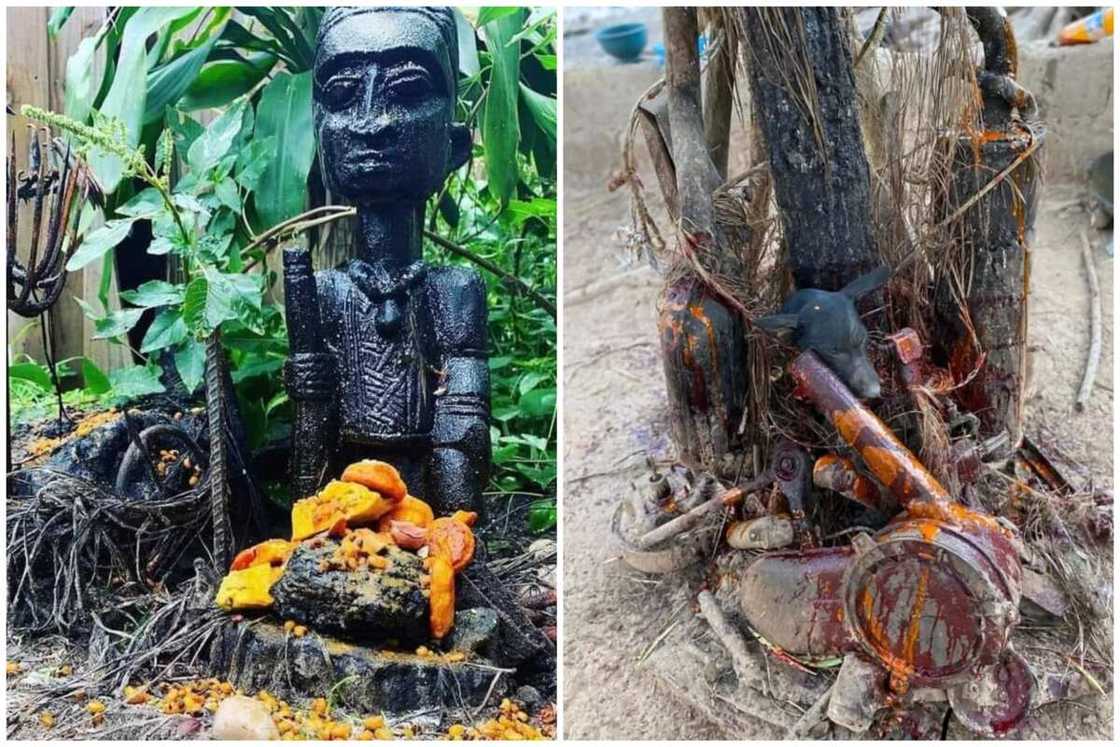
Source: UGC
Ògún is one of the powerful Orisha gods. He is the giver of iron and also the Warrior God of War. He oversees metalwork and conflicts that arise within the Yoruba people. Ògún is also the god of pioneering, intelligence, justice, medicine and political power.
Ògún blesses weapons production but does not interfere with what the individuals choose to do with the weapons. He lets the individual who possesses the weapon to decide its destiny. Apart from the Yoruba people, he is also an important deity for other West African peoples, as well as those who practice Haitian Vodou.
6. Kibuka
Kibuka is one of the ancient African gods in the Buganda Empire Kingdom. He is the god of war and has been with Buganda since the 9th century. Kibuka is the brother of Musaka, the god of prosperity, fertility and harvest. The military of Buganda encountered many defeats, and Mukasa helped the Kingdom by providing his younger brother to be their god of war.
Kibuka often advises Baganda kings during the war, diseases, and other catastrophic events. Just like Mukasa, his older brother, Kibuka, used to be mortal but ascended to godhood.
7. Adroa
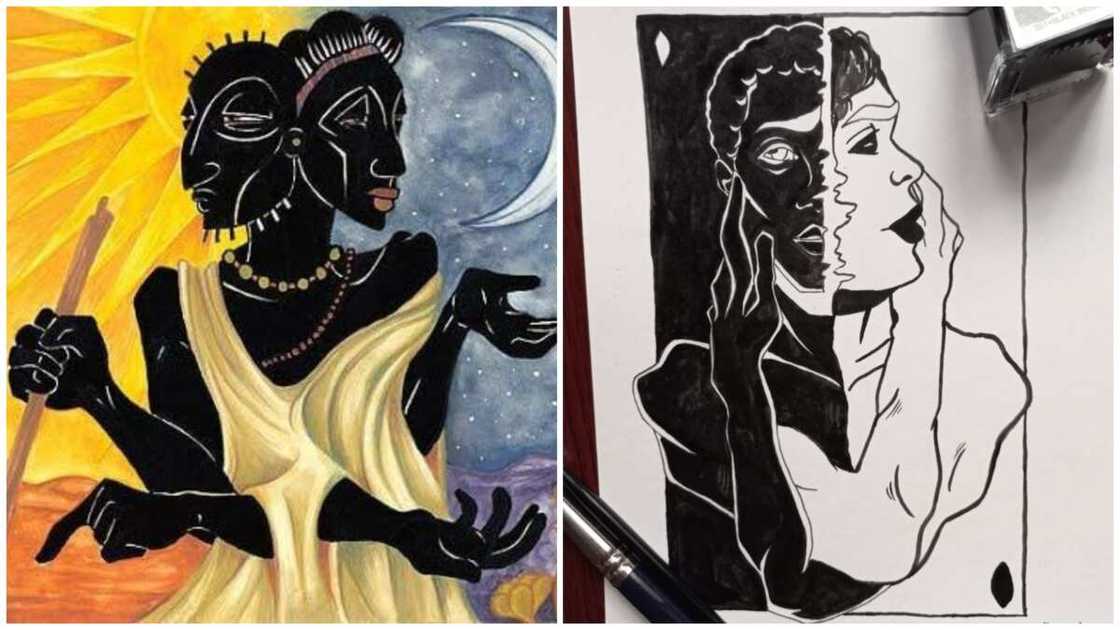
Source: UGC
Adroa is the god or spirit of the Lugbara community in Uganda and Congo. He was known as Adroa ‘ba o’bapiri', which means 'god, the creator of men'. He was said to be the creator of the first man Gborogboro and the first woman, Meme. The first man and woman were twins and were considered the ancestors of Lugbara.
Adroa has good and evil characteristics due to his duality, and his body is divided into two. He will manifest himself to people in any form that fits the situation at hand; it is also believed that this god appears to individuals before they die.
8. Obatala
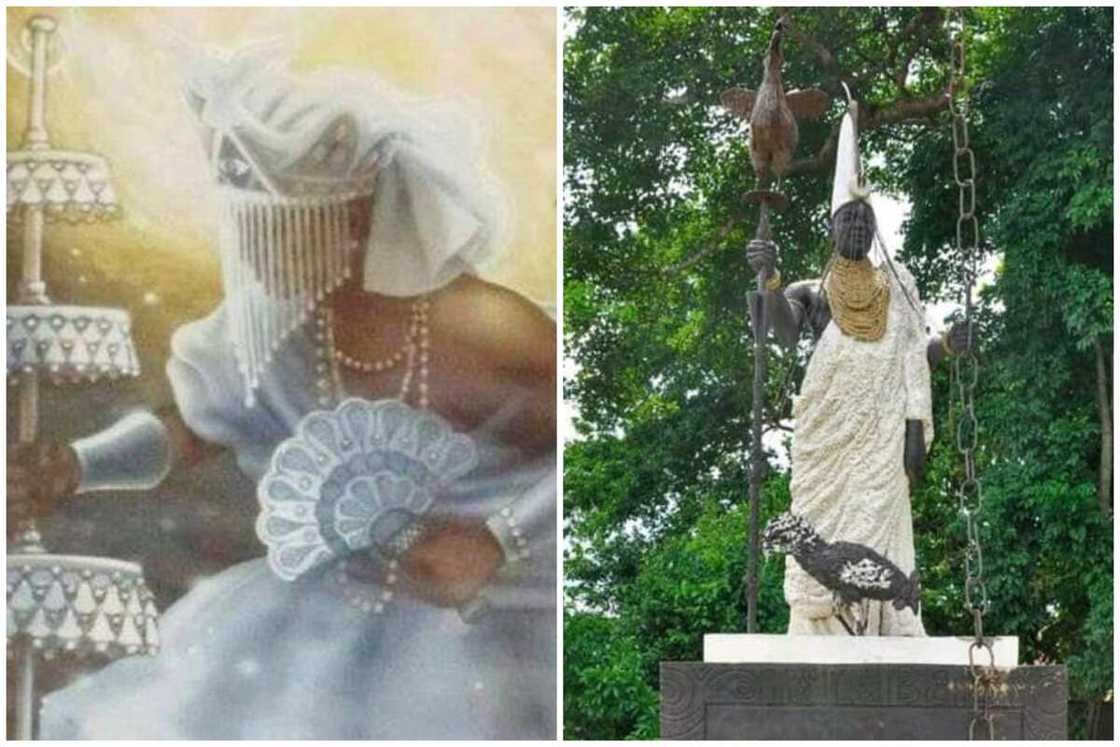
Source: UGC
Obatala is known as the sweetest Yoruba god of compassion towards human beings. He is considered the 'Child of God'. This is because their father is the powerful Olorun. Obatala does not identify as male or female; they are identified as androgynous. He is married to Yemaya, the goddess of oceans and the godmother of Orishas.
Obatala is free of all colours, even though he is associated with whiteness primarily because white light is polychromatic. He is known as the god of white clothes and only accepts white offerings without spices. The worshippers of Obatala dance in white costumes.
9. Oya
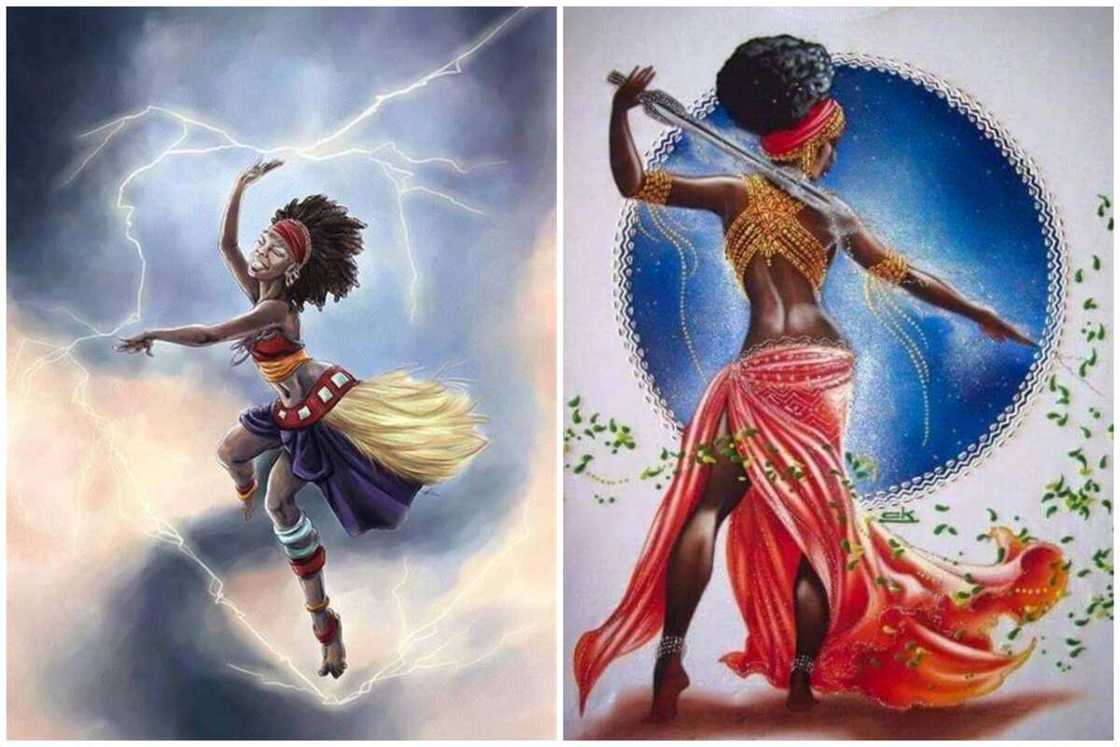
Source: UGC
Oya is one of the mighty African pantheons believed to be the goddess of weather. She is also one of the Orisha deities. Oya is the one who brings good weather. She is a fierce and mighty warrior with a sword or machete in one hand and a fan in the other.
Her fan is said to have the power to control the winds and bring about storms, while her sword is used to cut through obstacles and bring about change. She is one of the African goddesses believed to have the power to control rain and bring fertility to the earth.
10. Inkosazana
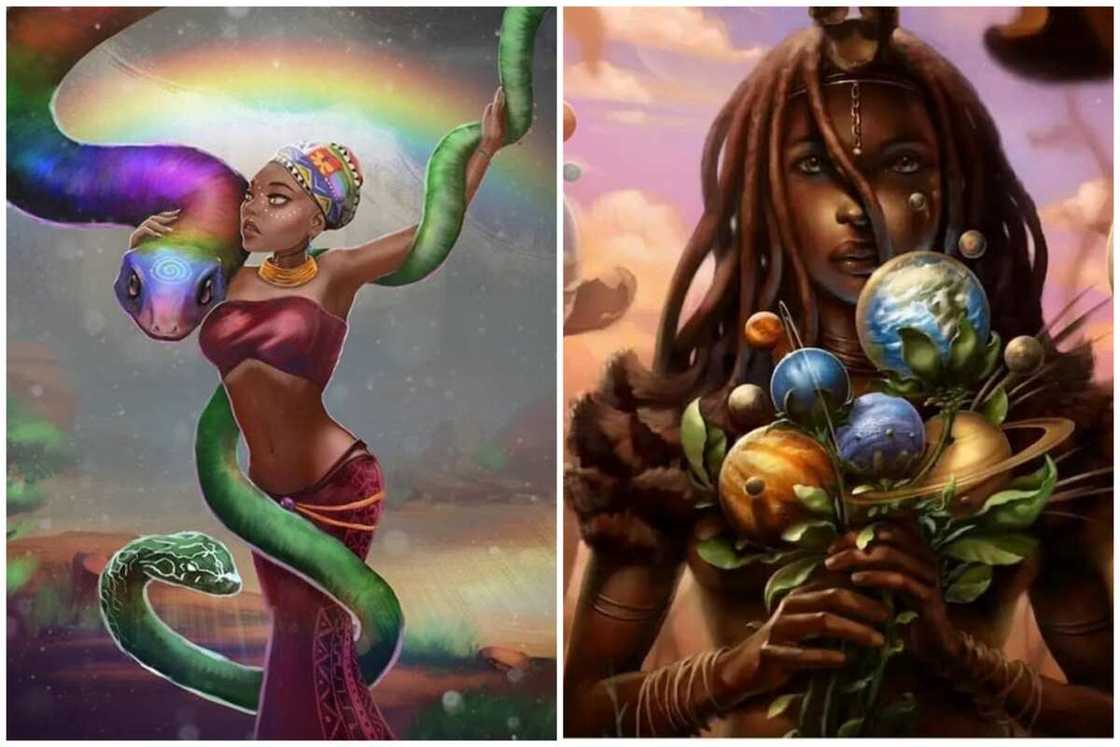
Source: UGC
Inkosazana is referred to as the ‘mermaid’. She is a Zulu goddess adored by the Zulu community in South Africa. Inkosazana is the goddess of fertility and agriculture; she protects both young and old and appears only to the pure in her heart. The South Africans believe she manifests herself in other forms, such as animals.
Inkosazana dwells in water, where she is said to appear. She can also come in dreams, heal the sick, and helps the troubled. She is thought to be responsible for corn, one of the vital dietary supplements in the Zulu tribe.
11. Oshun
Oshun is the African goddess of love. In the Yoruba cosmology of Southwestern Nigeria and Benin, Oshun is the goddess, or Orisha, of love, sensuality and femininity. Her image is represented by a stunning and charming young lady.
She is the goddess of sweet and fresh water. Oshun is also believed for her abilities to heal the sick, bring fertility and foster prosperity. She is regarded as a highly benevolent deity. She protects the River Oshun in Nigeria, where the last sacred grove in Yoruba culture dedicated to Oshun is located.
12. Ala
Ala is one of the ancient Igbo goddesses. The name ‘Ala’ means earth demonstrating her power over the planet. She is the goddess of fertility, land, morality and creativity. She rules over the underworld and holds the deceased ancestors in her womb.
Ala also judges human actions and oversees Igbo law and customs. Ala's messenger and living agent on earth is the python, especially revered in many Igbo communities. This goddess is honoured and celebrated during the yearly yam festival.
Who is the most powerful goddess in Africa?
Oshun, the goddess of love, is considered one of the most powerful Orishas. This is because of her attributes, like vanity, jealousy and spite.
African gods and goddesses are significant in African history because they have shaped the world and influenced the lives of human beings. They are powerful beings believed to be the world's creators. Each one of the deities possesses special powers.
READ ALSO: Longest river in the world: top 10 contenders for the title
Legit.ng recently published an article about the longest river in the world. The world consists of many rivers with long waterways, some stretching across several countries. Most of the rivers in the world are freshwater which many communities use for domestic and commercial purposes.
Long rivers are found on almost all continents; others stretch through several countries. One of the longest rivers in the world is the Congo River which is the second longest river in the whole of Africa. Other rivers include the Yellow River and the Yenisei.
Source: Legit.ng


